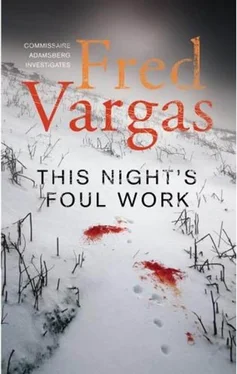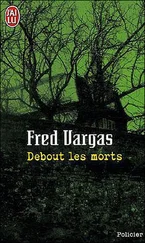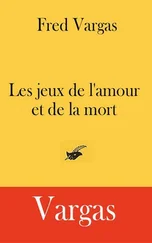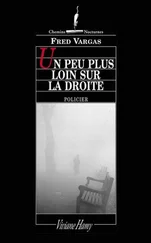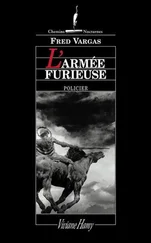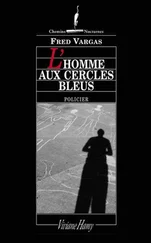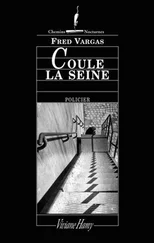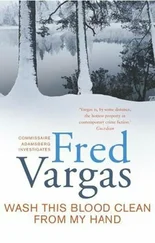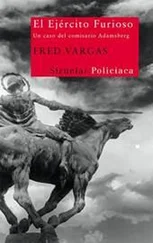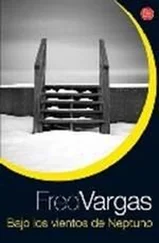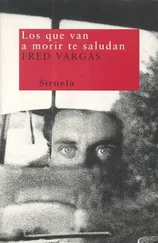NO SOONER HAD ADAMSBERG LEFT ARIANE THAN A HAILSTORM SWEPT OVER the Boulevard Saint-Marcel, blurring its outlines and making a Parisian avenue look like any country road drenched by a sudden flood. Adamsberg walked on contentedly, since he was always happy in a downpour and was now also satisfied to be able to close the file on the killer in Le Havre after twenty-three years. He looked up at the statue of Joan of Arc, who was bearing the assault of icy hail without flinching. He felt heartily sorry for Joan of Arc; he would have hated to hear voices telling him to do this and that. He already had enough trouble obeying his own instructions, or indeed even identifying them, and would have seriously objected to orders coming from celestial voices. Voices like Joan’s would have taken him into the lions’ den after a brief and glorious epic struggle, since that kind of story always ended in tears. On the other hand, Adamsberg did not object to picking up the pebbles that heaven placed in his path to charm him. He needed another one for the Squad, and was searching for it.
When, after the five weeks’ compulsory leave ordered by his divisionnaire , he had come back from the Pyrenees to the Paris Crime Squad, he had brought with him thirty or so grey pebbles, washed smooth by the river, and had placed one on each of the desks of his colleagues for them to use as paperweights or anything else they pleased. A rustic offering that no one dared refuse, even those who had no wish to keep a pebble on their desk. An offering which did not help them understand why the commissaire had also brought back with him a gold wedding ring now to be seen on his finger, and striking sparks of curiosity from every doorway he passed. If Adamsberg had got married, why hadn’t he told the team? And above all, who had he married, and why? Had he finally and straightforwardly married the mother of his son? Or somehow forged a fraternal union with his long-lost brother? Or a mythical one with a swan? With Adamsberg, all solutions were possible, as rumours flew quietly from desk to desk and from pebble to paperweight.
It was generally expected that Commandant Adrien Danglard would resolve the puzzle, partly because he was Adamsberg’s longest-standing colleague, having spent years alongside him in a relationship which allowed for no concealment or precautions, and partly because Danglard couldn’t stand Unsolved Questions. These Unsolved Questions cropped up at every turn, like dandelions, turning into a host of uncertainties, fuelling his anxiety and making his life a misery. Danglard worked ceaselessly to eliminate the Unsolved Questions, like a maniac who keeps trying to remove non-existent specks from his coat. The gigantic task usually led him to a dead end and then to a feeling of powerlessness; the powerlessness, in turn, drove him down to the basement of the building, where the bottle of white wine was concealed, the only thing that could help him deal with any Unsolved Question that was too thorny. If Danglard took the trouble to conceal his bottle so far away, it was not for fear that Adamsberg would discover it, since the commissaire was, by some supernatural means, perfectly aware of his secret. It was simply that going up and down the spiral staircase to the basement was sufficient of an obstacle for Danglard to postpone calling on his heart-starter until later. So he patiently gnawed away at his doubts at the same time as he chewed incessantly at the ends of his pencils.
Adamsberg had developed a theory running exactly contrary to the pencil-chewing, which posited that the number of uncertainties a single person can support at the same time cannot multiply indefinitely, and reaches a maximum of three or four. That did not mean that there were no more, but that only three or four uncertainties could be in proper working order simultaneously inside a human brain. Danglard’s mania for eradicating them was therefore futile, since no sooner would he have resolved two Unsolved Questions than another two would take their place, and he would not have had to concern himself with these if he had had the wisdom to stick with the old ones.
Danglard had no time for this hypothesis. He suspected Adamsberg of liking uncertainty to the point of inactivity. Of liking it to the point of deliberately creating it himself, to cloud the clearest perspectives, for the sheer pleasure of wandering irresponsibly through them, in the same way he liked walking in the rain. If one didn’t know the answer, if one didn’t know anything, why bother one’s head about it at all?
The sharp conflicts between Danglard’s precise ‘Why?’ and the commissaire’s nonchalant ‘I don’t know’ punctuated the squad’s investigations. None of the others tried to understand the core of this bitter struggle between accuracy and vagueness, but they all favoured one side or another. The positivists thought that Adamsberg dragged out investigations, taking them wilfully into the fog, leaving his colleagues trailing behind him without instructions or road maps. The others, the cloud shovellers – thus named after a traumatic visit by the squad to Quebec – thought that the commissaire ‘s results quite justified the vagaries of the investigation, even if the essentials of his work methods escaped them. According to mood, or to the circumstances of the moment, which might inspire either jumpiness or relaxation, someone could be a positivist one day and a cloud shoveller the next or vice versa. Only Adamsberg and Danglard, the two principal antagonists, never varied their position.
Among the more anodyne Unsolved Questions there was still that wedding ring glinting on the commissaire’s finger. Danglard chose the day of the hailstorm to ask Adamsberg about it, simply by looking pointedly at the ring. The commissaire took off his wet jacket, sat sideways and stretched out his hand. The hand, too big for the size of his body, weighed down at the wrist with two watches which rattled together, and now further embellished with the gold ring, did not match the way he dressed, which was negligent, bordering on the scruffy. It was as if the richly adorned hand of some old-fashioned aristocrat were attached to the body of a peasant, excessive elegance conjoined with the sunburnt skin of a mountain villager.
‘My father died, Danglard,’ Adamsberg explained calmly. ‘We were both sitting under a pigeon-shooting hide, and watching a buzzard circling in the sky over our heads. The sun was very bright, and he just keeled over.’
‘You never told me,’ muttered Danglard, who found the commissaire ‘s secrets irritating, for no reason.
‘I stayed there until evening, lying beside him, holding his head against my shoulder. We might be there yet, but some hunters came across us at nightfall. Before they closed his coffin, I took his wedding ring. Did you think I had got married? To Camille?’
‘I had wondered.’
Adamsberg smiled.
‘That’s a Question Resolved, Danglard. You know better than I do that I’ve let Camille go ten times, thinking that the train would come along for the eleventh time on a day that suited me. But that’s just when it stops coming along.’
‘You never know, the points might change.’
‘Trains are like people, they don’t like going round in circles. In the end it gets on their nerves. After we buried my father, I amused myself picking up pebbles from the river bed. That’s something I can do. Think about the infinite patience of the water, running over the stones. And the stones allow it to run, but the river is gradually wearing away all their rough edges, without seeming to. The water wins in the end.’
‘If it comes to a fight, I’d prefer stones to water.’
Читать дальше
